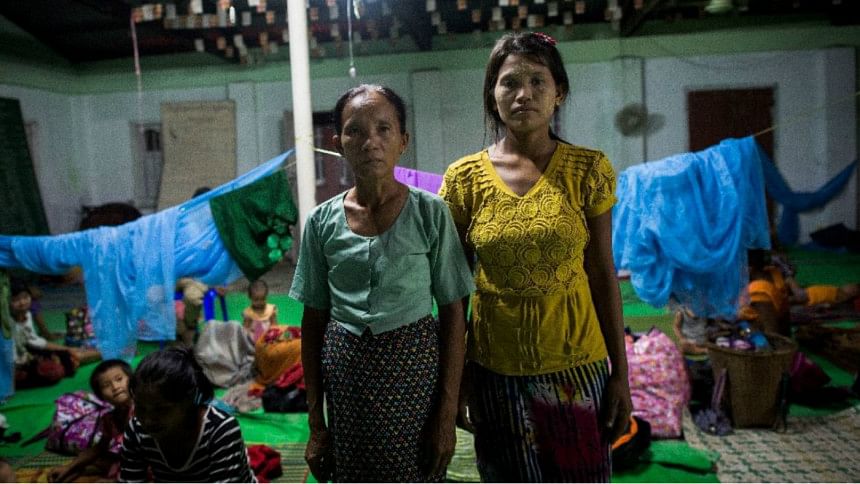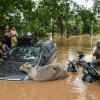Buddhists, Hindus also flee Myanmar's sectarian clashes

Village chief San Tun's remote Mro tribe used to get by foraging in the Myanmar jungle, living among the patchwork of ethnic groups who co-existed imperfectly in Rakhine state.
But last month murder visited his community.
An attack on his people, allegedly by Muslim Rohingya militants, was the catalyst for the worst round of fighting the region has ever seen, forcing them to flee death, arson and suspicion.
San Tun says Rohingya militants killed eight villagers as they were out foraging, including his brother and oldest son, on August 3.
Following the deaths a build-up of security forces in northern Rakhine sent tensions soaring.
Heavy fighting broke out three weeks later between Islamist militants and security forces, causing some 73,000 Rohingya Muslims to flee west into Bangladesh, bringing with them harrowing tales of rape and murder at the hands of the military and Buddhist mobs.
But a smaller and similarly terrified stream of civilians from Rakhine's Buddhist and Hindu communities -- some 11,000 -- have headed in the opposite direction, their lives also upended by neighbour turning on neighbour.
The Mro, a forest-dwelling and mainly Buddhist tribe who live on Myanmar's border with Bangladesh, are among them, fleeing the latest round of violence in which they had played an inadvertent central role.
"We Mro used to live on the forests and mountains, our only business was farming since the time of our ancestors," San Tun, 46, told AFP earlier this week in a government-controlled village outside Maungdaw, the main town in northern Rakhine to which many Buddhists and Hindus have escaped.
"Now we have no security," he lamented.
Tit for tat
Rakhine, Myanmar's poorest state, has become a crucible of religious hatred focused on the Rohingya, who are reviled and perceived as illegal immigrants in the Buddhist-majority country.
The Rohingya militant group fighting Myanmar's military since last October -- the Arakan Rohingya Salvation Army (ARSA) -- said the coordinated ambushes they launched on August 25 were in response to the fresh security crackdown on their kin.
San Tun said many of his Mro people -- who number between 20,000 and 40,000 -- had to leave everything behind as they sought sanctuary in government-held areas, fearful Rohingya militants would target them again.
Now in relative safety his thoughts turned to the village livestock and ripe paddy fields they were forced to abandon.
"There is no one left to feed them, I think our pigs will have died," he said.
Han Thein, an ethnic Rakhine Buddhist, said her village of Khan Thaya was one of the places ambushed by Rohingya militants on August 25.
They spent the night hiding out in nearby forest. After the fighting died down, her 62-year-old husband returned to see if he could salvage anything. But Ha Thein decided to press on to Sittwe, Rakhine's state capital. She has not heard from him since.
"I was just worried for my grandchildren," she told AFP in the grounds of a Buddhist monastery where many refugees had gathered to wash what little clothing they had with them and rest.
"We just ran, we didn't think about anything other than our safety. But now I am very worried for my husband. He is old."
Some of those gathered in Sittwe said it was not the first time they had been forced to flee because of sectarian fighting.
"This is the third time I have left my village," said San Mae, a 52-year-old Rakhine Buddhist.
She first fled Baw Di Kone village in 2012 when sectarian riots coursed through Rakhine, killing more than 100 people and forcing some 120,000 people, mostly Rohingya, into internal camps. Violence broke out again in 2015.
'We were once brothers'
But the current round of fighting is the worst Rakhine has ever experienced.
For the first time, the state's small Hindu population has found itself targeted.
Last week an AFP reporter visited a hospital in Maungdaw where the bullet-riddled bodies of six Hindu construction workers had been brought. Survivors said the group had been ambushed by Rohingya militants.
"We came here for a while because Muslims were causing disturbances," Chaw, a 50-year-old Hindu woman in Maungdaw, told AFP. "But we do not know where we will go if the situation gets any worse."
Rohingya refugees crossing into Bangladesh have confirmed that some of their men have stayed behind to join ARSA and fight Myanmar's military, often wielding little more than sticks and swords.
Analysts long warned that decades of state-sanctioned restrictions and persecution of the Rohingya risked fostering militancy among a Muslim minority that had largely eschewed violence.
But support for the militants is far from universal, with some Rohingya left in Rakhine saying they were furious the attacks have poured fuel on the flames of Myanmar's already vitriolic anti-Muslim tensions.
"We do not want terrorists," a Muslim Rohingya from the village of Maungni told AFP.
We will cooperate with the ethnic Rakhine (Buddhists)," he added. "We used to be like family and brothers before this."

 For all latest news, follow The Daily Star's Google News channel.
For all latest news, follow The Daily Star's Google News channel. 








Comments